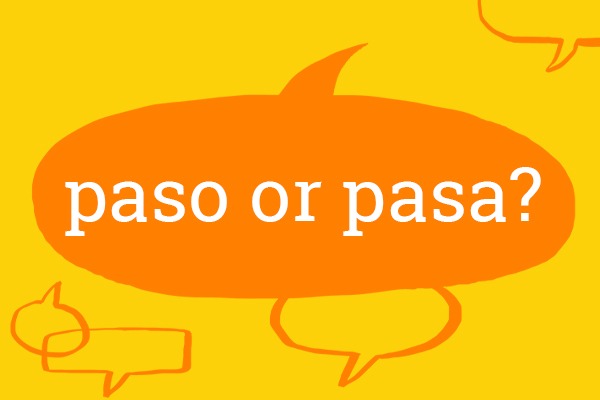It’s that time of the week when we step into the world of potentially confusable Spanish nouns and separate out how a particular pair is used. Today it’s the turn of paso (masculine) and pasa (feminine).
You can listen to the pronunciation of paso here:
Un paso is a step, as in one of a series of movements you make when walking. Un paso can also be a footstep, as in the sound of an advancing walker’s foot meeting the ground. Like step, paso can also be used figuratively.
cuando su hijo dio sus tres o cuatro primeros pasos
when their son took his first three or four steps
Manuela volvió sobre sus pasos.
Manuela retraced her steps.
Hubo un rumor de pasos precipitados.
There was a sound of hurried footsteps.
El gobierno ha dado un paso atrás.
The government has taken a step backward.
Additionally, paso is used when describing someone’s manner of walking:
La muchacha se limitó a acelerar el paso.
The girl just quickened her step or pace.
Algunos hombres la cruzaban con paso rápido.
Some men who were walking briskly passed her.
Paso can also denote the action of passing, whether literally or figuratively:
Mucha gente ha intentado cortarme el paso.
Many people have tried to block my way.
con el paso del tiempo
with the passage of time
¿Vienes por mucho tiempo? ‒ No, solo estoy de paso.
Are you staying long? No, I’m just passing through.
You can listen to the pronunciation of pasa (feminine) here:
Una pasa is a dried grape, a raisin.
la exportación de pasas
the export of raisins
Le invitaré también a un platillo de almendras tostadas y pasas.
I’ll also get you a dish of toasted almonds and raisins.
DID YOU KNOW?
Did you know that there are different types of dried grape or raisin?
Una pasa de Corinto is a currant, sometimes known as a Zante currant or a Corinth raisin. It is small and dark and has an intense, tangy flavour.
Una pasa de Esmirna is a sultana, sometimes called a golden raisin. It is fatter and juicier than other types of raisin.
Applied to fruit such as grapes, plums, figs and so on, paso can also be an adjective meaning dried (often in the sun). As a result, una uva pasa is another name for a dried grape while una ciruela pasa is a prune.
Join us again next week as we continue comparing and contrasting similar-looking Spanish nouns.



